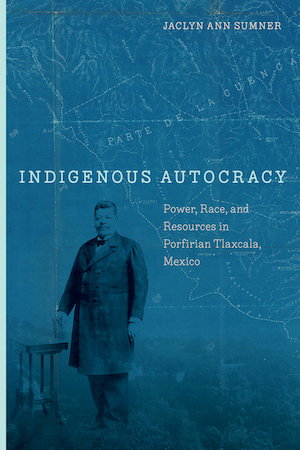PC professor Dr. Jaclyn Sumner’s first book hits shelves Nov. 14
by Kathryn Dover

Dr. Jaclyn A. Sumner
Associate Professor of History
Department Chair
Presbyterian College history professor Dr. Jaclyn Sumner will have her first book published this month with Stanford University Press.
The book, Indigenous Autocracy: Power, Race, and Resources in Porfirian Tlaxcala, Mexico, is a project that she has been working on for more than a decade, starting with her 2014 dissertation at the University of Chicago.
“The book is about how politics worked on the local and regional levels in Mexico during a really long period of dictatorship in Mexico, from the late 19th to early 20th centuries,” Sumner said. “The book investigates how a governor of this state of Tlaxcala navigated and balanced between the demands of a dictator who wanted to modernize Mexico at all costs and the local people who were trying to hold on to their resources and have some say in how their lives were going to be managed on a day-to-day level.”
Dr. Mikael Wolfe, a history professor at Stanford University who reviewed Sumner’s book, stated Indigenous Autocracy unlocks the secret to Gov. Próspero Cahuantzi’s long political career.
“Compellingly arguing that the secret to Cahuantzi’s political longevity was a deft and selective use of his indigeneity and its signifiers, the book effectively integrates cultural, political, and environmental history to revise our understanding of Porfirian Mexico,” he wrote.
Sumner’s book also earned critical praise from Northwestern University professor Dr. Paul Gillingham.
 “Reconstructing in painstaking detail the life and times of a powerful Indigenous governor, Jaclyn Ann Sumner gives us a heady combination of predictable elite thuggery and development with far less predictable racial politics, regional autonomy, development, environmental consideration, and even populism,” he stated. “The result is credible, readable, and professionally unmissable.”
“Reconstructing in painstaking detail the life and times of a powerful Indigenous governor, Jaclyn Ann Sumner gives us a heady combination of predictable elite thuggery and development with far less predictable racial politics, regional autonomy, development, environmental consideration, and even populism,” he stated. “The result is credible, readable, and professionally unmissable.”
Sumner, associate professor and history department chair at PC, was interested in studying what life was like for Indigenous Mexicans after Mexico gained independence from Spain. While exploring this topic, she came across the Indigenous governor of Tlaxcala, Mexico, who inspired Indigenous Autocracy.
“Everyone legally under the law was free and equal regardless of their race, but in practice, as I was studying this stuff, I was realizing that there were all sorts of ways that Indigenous peoples, Indigenous Mexicans, were discriminated against,” Sumner said. “So, here’s this Indigenous governor, who is the longest lasting governor during this period of dictatorship in Mexico. That’s what got me interested in it, because it just was not typical for Indigenous peoples, for Indians, to have power in any way.”
That Tlaxcala’s governor was from Tlaxcala and did not hide his Indigenous heritage further intrigued Sumner.
“He was one of the rare governors who the dictator appointed who actually was from the state that he governed,” Sumner said. “Why does that happen? Why is it that this particular place, Tlaxcala, is chosen to have a leader that is native of this state? These are all kinds of questions I explore.”
Sumner’s research for Indigenous Autocracy has further helped her guide students in their own research projects.
“I’ve advised a lot of capstone projects that have to do with questions of gender and race and discrimination in Latin America, and I’ve done a couple of Summer Fellows projects, too, that have focused on those themes,” Sumner said. “Being really up to date with all of this research that’s going on in my field, which is required to write a book, has really been helpful to help me advise my students and to guide them and to have them be reading the most cutting-edge historical research that’s out there. There’s an important connection between faculty research and helping our student population, and not just in the sciences.”
After her book is published, Sumner hopes to return to the project that originally intrigued her: studying immigration patterns from Mexico to the United States, specifically to the U.S. South.
Readers may order Indigenous Autocracy online at Stanford University Press.
